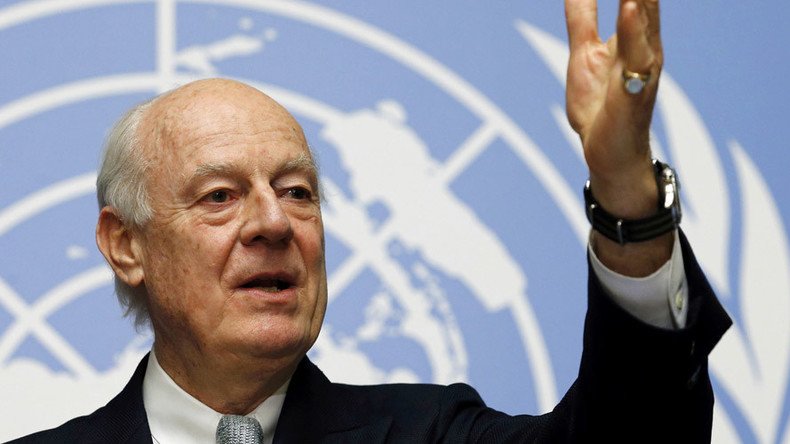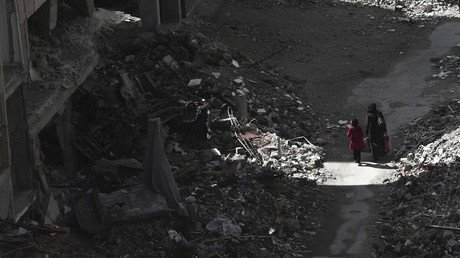The peace negotiations between Syria’s warring sides will continue, said UN envoy Staffan de Mistura after meeting the Saudi-backed opposition. Though he stated that he is “optimistic,” the opposition delegation threatened on Sunday to quit the Geneva talks.
De Mistura met with the Riyadh-backed High Negotiations Committee (HNC) in a Geneva hotel on Sunday, he told reporters, adding that it was a “courtesy call.”
“They deserved that we pay attention to their own concerns," he explained. "I have been explaining what is the [peace] plan and what all meetings are about.”
He told journalists that the HNC would announce “when and how they can be part of this exercise."
"I am optimistic and determined because it's an historic occasion not to be missed," Mistura said.
However, Mistura’s optimism was overshadowed by the HNC’s statement Sunday that the opposition could walk out of the Geneva talks.
The coordinator of the body, Riad Hijab, said in an online statement on Saturday that there would be no justification for the main opposition group to remain part of the peace process if UN doesn’t put pressure on Damascus to end military actions in rebel-held areas. The opposition also accused the Syrian government of hampering the delivery of humanitarian aid to besieged areas.
"In view of the regime and its allies' insistence in violating the rights of the Syrian people, then the presence of the HNC delegation in Geneva would not have justification and the HNC could pull its negotiating team," Hijab said.
Bassma Kodmani, who is part of the opposition negotiating delegation, told a news conference on Sunday: "We only came to Geneva after receiving assurances and commitments and we have precise commitments on the fact there would be serious progress on the humanitarian situation."
"We can't start political negotiations until we have those gestures (in place)," he added.
Farah Atassi, another opposition delegation member, said it was too early to say how long the delegation would stay.
READ MORE: Lavrov, Kerry hold last-minute phone call ahead of Syria peace talks in Geneva
The Syrian government, in turn, said on Sunday that it is considering humanitarian corridors, ceasefires and prisoner releases. "Absolutely, this is part of the agenda that we agreed upon and that will be one of the very important topics we will discuss among ourselves as Syrian citizens,” said Bashar al-Jaafari, head of Syria's delegation at peace talks in Geneva.
He told reporters on Sunday that the full list of the members from the opposition remains unclear for Damascus as well as for the UN.
“No one up till the present moment knows who the other party is, and there hasn’t been a final list of the participants so far,” he said.
He criticized the opposition for a lack of “seriousness and responsibility,” referring to the delegation’s delayed attendance at Geneva, as well as setting preconditions for the talks.
“We want to implement what was previously agreed on. We don’t want to start from scratch as that would be a waste of time at the expense of the Syrian people’s pains,” he said, SANA state news agency reported.
“We have proved our good intentions and the government’s positive attitude towards any international UN effort to find a solution, but the problem has always been with the other party.”
He also branded some of the opposition members as terrorists backed by foreign powers.
"We don't deal with terrorists," he said. "There are foreign powers endorsing foreign agendas, aiming at putting political pressure on the Syrian government by using terrorism as a political weapon."
He said that the negotiations started with repeating the same mistake that occurred at the Geneva-2 talks in 2014.
“When the Security Council resolution states that the broadest possible spectrum of the position be brought together by the Syrians themselves, and this resolution is being violated, then it means that there are some who want to impose a fait accompli by selectivity and double standards,” he said.
A representative of the Jaish al-Islam (Army of Islam) group, a coalition of Islamist and Salafist armed units fighting against the troops of Syrian President Bashar Assad, is expected to take part in the talks.
Mohamed Alloush, who represents Jaish al-Islam told Reuters on Sunday he was heading to Geneva to take part in the talks.
Damascus and Moscow consider it to be a terrorist organization and both have been opposed to its participation in the talks.
Meanwhile, Syrian Kurdish groups who were hoping to be included have left Geneva after being excluded.
Russian FM Sergey Lavrov, who backs the Kurds’ participation, will meet his US counterpart John Kerry on February 11 to evaluate the progress of the “proximity talks,” according to the Russian Foreign Ministry’s statement Saturday.
As Syria's government and opposition began gathering in Geneva for the first UN-mediated peace talks in two years, explosions rocked Damascus, killing at least 45 people. The Islamic State terrorist group (IS, formerly ISIS/ISIL) has claimed responsibility for the attacks.


